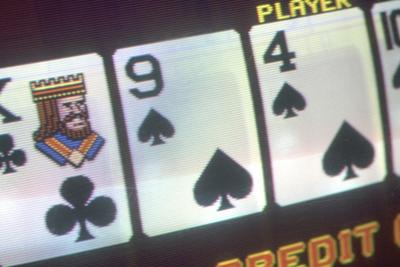
This file photo shows an unlicensed gaming machine in another state. Employees at two St. Joseph gas stations declined to discuss the devices or allow photographs in their facilities.
The day Missouri’s casinos reopened, customers were greeted with the familiar sights and sounds of slot machines that had gone dark for more than two months.
But across town, another type of gambling continued much as it had since the coronavirus shutdown. A customer sat at the back of a gas station and peered into the video terminal of an electronic gaming device, one that’s often referred to as a “prereveal” or “no chance” game. These look and sound like a regular slot machine, but they manage to skirt the gray area of what kind of gambling is authorized in Missouri.
In St. Joseph, Tom Cobb can only shake his head as these unlicensed devices proliferate.
“Now we’ve got these things running rampant all across the state of Missouri,” he said. “In the meantime, the state of Missouri is losing money. In St. Louis they are setting up these things as fast as they can.”
In St. Joseph, too. The unregulated machines were found in at least two convenience stores on the South Belt Highway.
Cobb, owner and president of ACME Music & Vending in St. Joseph, said it’s common for his employees to report seeing these electronic devices when stopping in some gas stations to get snacks. There are an estimated 14,000 of the devices statewide, tucked into convenience stores, truck stops and fraternal organizations.
It creates another problem for Cobb’s business, which already faces the headwinds of an economic downturn. His company, a supplier of pool, darts, pinball and other legal games, finds itself losing market share to these rogue machines.
“It’s very, very depressing to try to run a legitimate business,” he said. “There are only so many discretionary dollars to go around.”
It’s a problem that isn’t isolated to Cobb’s business.
Missouri’s casinos and the state lottery both lose out. State lottery officials, in testimony in Jefferson City, estimate that unlicensed gambling siphoned off about $50 million.
That’s money that Missouri isn’t able to tax at a time when schools face painful cuts in state aid. With unlicensed machines, most of the profits go to the device maker and the gas station that houses it.
Adding insult to injury, some of these rogue machines didn’t face the same 10-week coronavirus shutdown as Missouri’s 13 riverboat casinos. Missouri lost an estimated $1 million a day in casino tax revenue during the shutdown.
“Unlike casinos, illegal slot machines do not generate taxes to fund public education or other state programs,” Mike Winter, executive director of the Missouri Gaming Association, said in a statement on the trade group’s website. “We support legislation to eliminate illegal slot machines all together.”
The degree that these devices operate outside the law is a matter of debate. An executive director of the Missouri Gaming Commission, the regulatory authority for Missouri’s casinos, said they violate the law. But the commission may lack statutory authority to enforce that opinion. Device makers, including one whose lobbyist maintains close ties to Missouri Gov. Mike Parson, point to ambiguities and workarounds that allow the machines to operate.
The Gaming Commission is closely watching a court case involving the operator of a video poker machine in Platte County.
“I think the commission is looking toward that outcome to see what the final disposition will be if the courts rule these are illegal,” said Gaming Commission member Pat Conway of St. Joseph. “I think the commission’s opinion is to try to get further regulations.”
Conway guesses that a resolution could be folded into the broader question of whether casino gambling is limited to the two major rivers and where sports wagering will be allowed, once the legislature decides on that issue.
“So you’ve got the illegals, you’ve got sports wagering and you’ve got the casinos trying to operate,” Conway said. “It’s been a pretty complex last 90 days for the gaming industry in Missouri.”
This year, Missouri lawmakers debated competing proposals for unlicensed slot machines, one that would open the door to legalization and another that sought to make them illegal, plain and simple. The bill to ban the devices passed in the Senate but couldn’t make it out of a conference committee.
For Cobb, it was a depressing end to the legislative session. He’s hoping the issue can come up in a special session.
“I don’t know why when the lottery asks to expand, they scream about gambling being expanded. But they turn a blind eye to these illegal games all across the state,” he said.